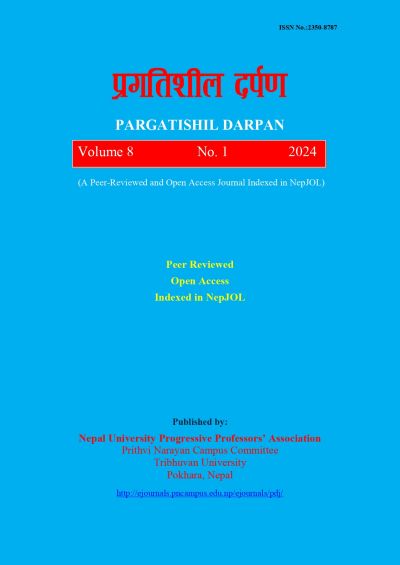A Thematic Study of Nyaya Philosophy with Research Methodology
DOI:
https://doi.org/10.3126/pd.v8i1.70349Keywords:
Aksa pada System, Hindu Philosophy, Nyaya Philosophy, Nyaya Sutra, PadarthasAbstract
This thematic study explores the intricate components of Nyaya philosophy and its methodological implications for educational research. This review examines the conceptual distinctions in ontological and epistemological perspectives currently employed within the theoretical framework of educational research. Nyaya philosophy, rooted in the universal truths of Hindu philosophy, serves as a foundation for developing research methodologies. Its sixteen divisions of Padarthas support four primary modes of knowledge acquisition: perception, inference, comparison, and testimony. Nyaya subtly steers researchers towards theoretical generalization in research design, emphasizing the importance of incorporating inductive and deductive procedures in the theoretical processes of educational research. Nyāya philosophy enhances research rigor through its ontological and epistemological principles. By using Nyāya’s categories of existence, substance, quality, and action—research questions are clearly defined. Nyāya’s logical rigor in data analysis ensures valid, consistent conclusions, aiding critical evaluation. Theory building is strengthened by its causation principles and categories, leading to comprehensive theories. Nyāya’s principles also improve the critical evaluation of literature, helping researchers assess and build upon existing knowledge systematically, achieving greater clarity and validity in their studies.
Downloads
Downloads
Published
How to Cite
Issue
Section
License
Copyright (c) 2024 The Author(s)

This work is licensed under a Creative Commons Attribution-NonCommercial-ShareAlike 4.0 International License.
This license enables reusers to distribute, remix, adapt, and build upon the material in any medium or format for noncommercial purposes only, and only so long as attribution is given to the creator. If you remix, adapt, or build upon the material, you must license the modified material under identical terms.




